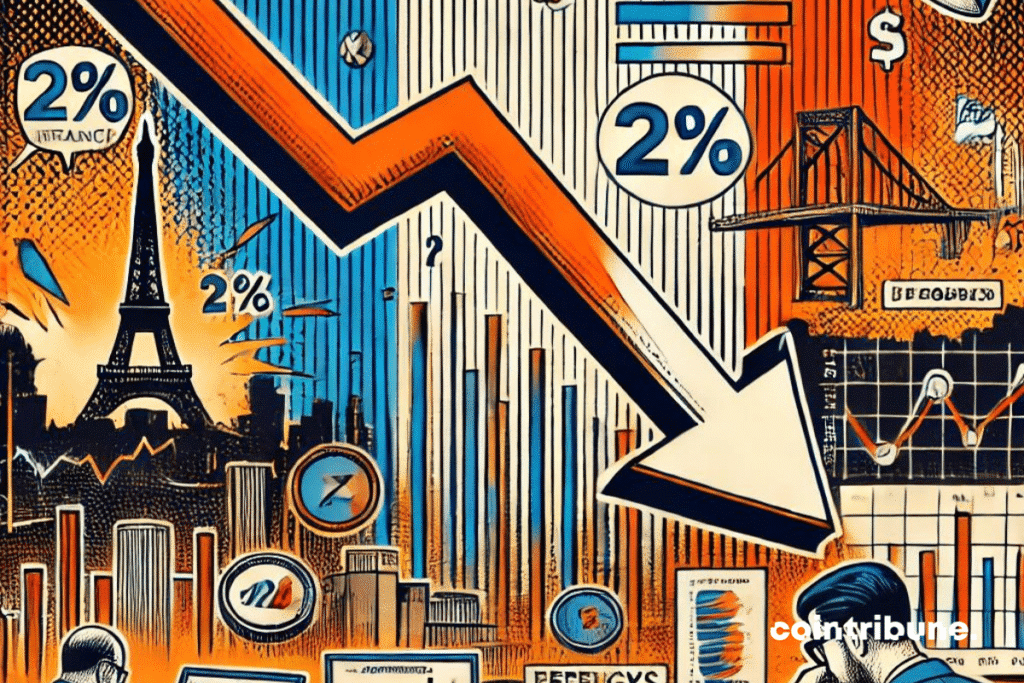Inflation Declining In France: Why This Return Below 2% May Not Last?
The French economic landscape has just passed a symbolic milestone: inflation has finally fallen below 2%, a first in three years. While economists and markets scrutinize every fluctuation in indicators, this return to a historically low rate marks a turning point after a period marked by incessant price increases, notably those of energy. In this post, we will analyze in detail the figures that confirm this trend, relying on the latest data provided by Insee. We will then examine the specific factors that contributed to this slowdown in inflation, and the implications of this development for consumers, businesses, and economic policies.

The dynamics of inflation below 2%
A few months ago, it seemed impossible! But France recorded inflation below the 2% threshold for the first time in three years, marking an unexpected return to relative price stability. According to the latest data published by Insee, consumer prices rose by 1.8% in August 2024 compared to the previous year, against 2.3% in July. This moderation is attributed to a marked slowdown in energy prices, which have been largely contained compared to the previous year. After months of tension over energy and food prices, this turnaround marks a notable easing, particularly in petroleum products, whose costs fell by 8% over a year. The Harmonized Index of Consumer Prices (HICP), which refers to the European level, also reflects this trend, falling from 2.7% in July to 2.2% in August, confirming that this price moderation movement is not isolated to France.
However, this improvement does not mask certain persistent areas of tension. In August, month-on-month inflation rose by 0.5%, against 0.2% in July, revealing still volatile dynamics. Tobacco prices continued to soar with an 8.7% increase, while service costs grew by 3% over a year, driven by a strong increase in transport service prices. This situation shows that while overall inflation is slowing, pockets of inflationary pressure remain, complicating the analysis of an economic situation far from being fully stabilized.
Energy, services, food: What the decrease doesn’t tell you about real price increases!
Inflation below 2% offers a welcome respite, but a finer analysis reveals that not all components of the economy are following this reassuring trend. Energy prices, which had skyrocketed last year, only slightly increased by 0.4% in August, showing a marked slowdown compared to the spectacular increases of 2023. However, electricity and gas continue to rise, by 10.5% and 9.4% respectively over a year, although their pace is now much more moderate. Food prices remain stable at +0.5%, illustrating stability in this sector where tensions had been particularly acute. This heterogeneity in price developments reflects an economy in full transition, where the dissipation of energy shocks coexists with persistent tensions in other sectors.
The impact of this relative disinflation, however, could be short-lived if other pressures persist. The cost of services, a key segment for the French economy, saw its rate of increase accelerate, particularly in transportation where prices rebounded sharply. This resurgence raises questions about the sustainability of this inflation decline in the medium term, especially as the European Central Bank, responding to the easing of prices, decided to lower its interest rates once again. While this provides relief for households and businesses, this policy remains dependent on the evolution of energy prices and economic resilience in Europe. The challenge for authorities will be to maintain this course without triggering new inflationary waves in an still uncertain economic context.
Maximize your Cointribune experience with our "Read to Earn" program! For every article you read, earn points and access exclusive rewards. Sign up now and start earning benefits.
Diplômé de Sciences Po Toulouse et titulaire d'une certification consultant blockchain délivrée par Alyra, j'ai rejoint l'aventure Cointribune en 2019. Convaincu du potentiel de la blockchain pour transformer de nombreux secteurs de l'économie, j'ai pris l'engagement de sensibiliser et d'informer le grand public sur cet écosystème en constante évolution. Mon objectif est de permettre à chacun de mieux comprendre la blockchain et de saisir les opportunités qu'elle offre. Je m'efforce chaque jour de fournir une analyse objective de l'actualité, de décrypter les tendances du marché, de relayer les dernières innovations technologiques et de mettre en perspective les enjeux économiques et sociétaux de cette révolution en marche.
The views, thoughts, and opinions expressed in this article belong solely to the author, and should not be taken as investment advice. Do your own research before taking any investment decisions.